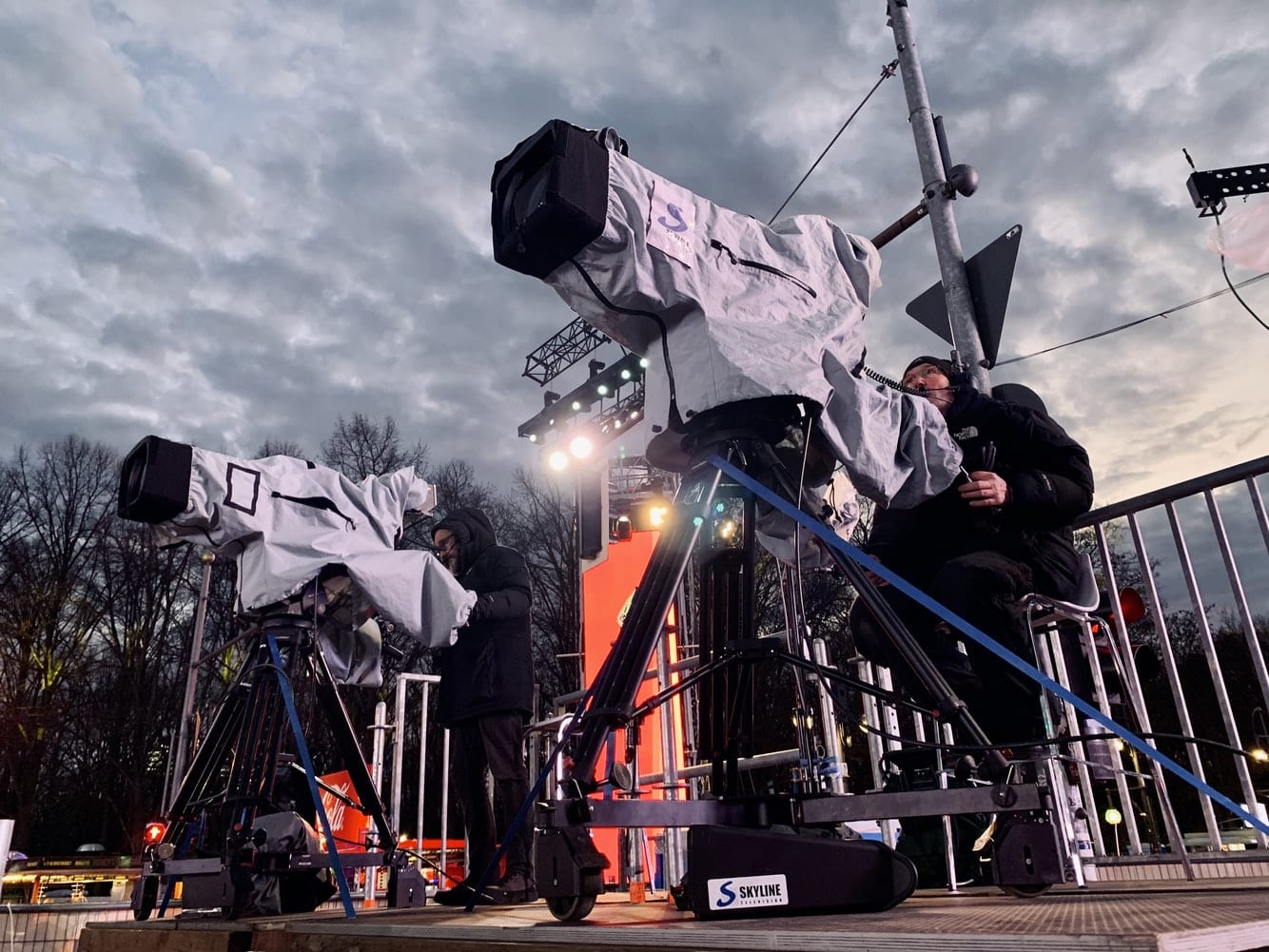Ways event production charlotte helps you connect with your audience
Exactly How Event Production Works: A Comprehensive Check Out the Process
Event production is a facility and organized procedure that requires careful planning and execution. It starts with establishing clear goals and comprehending the target audience. Each step, from budgeting to location option, plays a critical duty in guaranteeing success. As the process unravels, various elements need to line up perfectly. Yet, the nuances of this detailed operation frequently go undetected. What are the vital stages that add to an unforgettable event?

The First Planning Phase
When beginning on event production, cautious preparation is important to ensure an effective outcome. The preliminary drawing board functions as the foundation for all succeeding efforts. During this stage, event producers should specify the event's purpose and goals plainly. Recognizing the target audience assists customize the experience and messaging, assuring relevance and engagement.Producers have to additionally consider the event format, whether it be in-person, online, or crossbreed, as this will affect various logistical components. Choosing a suitable day and location is critical, as it influences accessibility and availability.Furthermore, setting up a reliable team is fundamental for separating responsibilities and improving communication. Establishing a timeline with milestones guarantees all jobs are finished on time. This phase entails comprehensive research study, consisting of determining prospective obstacles and devising approaches to reduce risks. Inevitably, a well-structured first planning stage sets the tone for an effective event production journey.

Budgeting and Resource Allowance
In event production, reliable budgeting and source allotment are essential for success - event production charlotte. Developing economic parameters sets the foundation for all succeeding choices, while resource circulation techniques guarantee that every part of the event is effectively sustained. With each other, these components aid preserve control over expenses and optimize the usage of available resources
Establishing Financial Parameters
Establishing economic parameters is crucial to the success of any type of event production, as it establishes the foundation for effective budgeting and resource allotment. This procedure begins with defining the total budget plan, which encompasses all aspects of the event, consisting of venue costs, food catering, and advertising and marketing. By determining readily available funds, event coordinators can prioritize expenses and assign sources accordingly. In addition, it is necessary to perform extensive marketing research to anticipate possible prices and identify financing resources, such as sponsorships or ticket sales. Establishing clear monetary specifications additionally help in risk administration, allowing organizers to reserve contingency funds for unforeseen expenditures. Ultimately, a well-defined budget plan offers as a roadmap, assisting the event production team towards accomplishing their goals while keeping monetary control.
Resource Circulation Strategies
Effective resource distribution approaches are crucial for optimizing the influence of an occasion while sticking to spending plan restraints. Successful event production needs a thorough approach to budgeting and source appropriation. Planners should focus on important components such as location, catering, and technology, making sure that funds are designated to areas that enhance participant experience. A detailed budget should detail anticipated expenditures and recognize areas for potential expense savings, such as discussing with suppliers or discovering sponsorship chances. Additionally, tracking expenses throughout the planning process assists protect against overspending. By employing tactical source circulation, event producers can supply a memorable experience while preserving monetary duty, ultimately contributing to the total success of the event.
Place Option and Logistics
Selecting the ideal venue is important to the success of any event, as it establishes the stage for the total experience. Location selection involves evaluating numerous variables, consisting of capacity, access, and location. Organizers need to take into consideration the target audience and the nature of the event, ensuring the venue lines up with the event's goals.Logistics play a significant duty in this procedure, including setups for seating, audiovisual equipment, and providing services. An appropriate venue must facilitate smooth flow for attendees and staff, enhancing engagement.Additionally, evaluating prospective locations for features like car parking, bathrooms, and fire escape is vital for security and comfort. The timeline for safeguarding the location is additionally critical, as popular areas might schedule promptly - event production charlotte. Detailed planning and prompt implementation can ultimately add to a seamless event experience, making place choice and logistics basic parts of effective event production.
Innovative Principle Development
While the place establishes the physical stage, innovative principle growth shapes the event's identity and narrative. This procedure starts with identifying the event's objective and target audience, allowing event producers to create an engaging theme that resonates with attendees. Brainstorming sessions usually consist of diverse point of views, fostering cutting-edge ideas that align with the event's goals.Once a motif is developed, visual elements such as shade palettes, signs, and style are made to boost the general atmosphere. Storytelling techniques may additionally be incorporated to create an appealing trip for individuals, guaranteeing a memorable experience. Furthermore, considerations pertaining to entertainment, tasks, and interactive components are lined up with the selected principle, enhancing the motif throughout the event.Ultimately, effective innovative concept development guarantees that every facet of the event works cohesively, leaving a long-term impact on guests and meeting the event's goals. This foundational job lays the groundwork for subsequent planning and execution stages.
Working together With Vendors and Distributors
Effective event production rests on efficient cooperation with suppliers and distributors. Choosing dependable partners, discussing agreements successfully, and guaranteeing timely shipments are vital action in this procedure. Each of these elements adds significantly to the overall success and smooth execution of an event.
Choosing Reliable Allies
Exactly how can event planners guarantee a seamless production experience? Choosing trusted companions is important in accomplishing this objective. Event organizers need to carry out comprehensive research to determine vendors and providers with a tried and tested performance history of excellence. This consists of inspecting referrals, examining profiles, and evaluating customer responses. Organizers should focus on partners who show professionalism, prompt interaction, and a desire to collaborate. Building solid connections promotes count on and makes it possible for quick problem-solving during the event. Furthermore, it is helpful to choose local vendors that recognize the location and regional logistics. Inevitably, a successful event rests on the synergy in between planners and their companions, ensuring that every element of production runs efficiently and efficiently.
Bargaining Agreements Properly
Effective negotiation of contracts is an important action in the partnership between event coordinators and their vendors and distributors. This procedure entails clear interaction of expectations, deliverables, and timelines. Coordinators must carry out thorough research study on market rates and sector standards to establish a baseline for settlements. It is necessary to create a collective atmosphere, motivating open discussion regarding terms, prices, and prospective backups. Coordinators must additionally focus on understanding the vendor's capacities and constraints to align their needs efficiently. Adaptability can lead to equally advantageous contracts, promoting lasting partnerships. Crafting well-defined contracts that consist of particular efficiency metrics can aid ensure accountability, inevitably leading to effective event implementation and complete satisfaction for all parties included.
Ensuring Timely Deliveries
Prompt shipments are vital for the smooth implementation of any kind of event, calling for diligent cooperation in between organizers and their suppliers and vendors. Effective interaction is crucial, as it helps establish clear expectations regarding shipment schedules, quantities, and details needs. Organizers commonly produce thorough timelines to describe important turning points, ensuring all celebrations remain aligned throughout the process. Routine check-ins with vendors can assist determine possible delays early, permitting proactive options. Additionally, constructing strong relationships with trustworthy suppliers fosters trust fund and responsibility, which can cause better service and prioritization. By prioritizing these joint initiatives, organizers can reduce interruptions, thereby boosting Web Site the total performance of event production and making sure that all necessary products and services show up as prepared.
Advertising And Marketing and Promo Approaches
While arranging an occasion, the success of marketing and promotion techniques can significantly affect participation and involvement. Reliable strategies typically consist of a combination of digital advertising and marketing, typical advertising and marketing, and grassroots outreach. Making use of social media systems enables real-time interaction and targeted advertising, getting to details demographics effectively. Email marketing projects can further involve possible participants with individualized material and reminders.Collaborations with influencers or industry leaders can likewise improve reliability and expand reach. Creating engaging content, such as videos or blog sites, aids to create buzz and suffer interest leading up to the event. In addition, leveraging early-bird discounts and special rewards can incentivize ticket purchases.Promoting through standard networks, such as posters or local media, remains appropriate, especially in community-focused occasions. An extensive technique that integrates several methods warranties maximum visibility and engagement, inevitably contributing to the event's success and the creation of a remarkable experience for guests.
On-Site Implementation and Management
On-site execution and administration are vital parts that identify the total success of an occasion. Effective sychronisation during the event ensures that all elements straighten with the intended program. Event supervisors oversee logistics, consisting of supplier sychronisation, equipment setup, and visitor solutions. Keeping track of timelines and resolving any unforeseen issues are basic for keeping a seamless experience.The team plays a considerable function, as qualified employees are in charge of different tasks such as registration, info circulation, and technical support. Communication among employee is imperative; it fosters a joint atmosphere and enables fast resolution of challenges.Additionally, safety and security protocols need to be stuck to, guarding the health of all guests. Post-event analyses are also component of on-site management, giving insights for future enhancements. By concentrating on these elements, event manufacturers can develop unforgettable experiences that fulfill or exceed participant assumptions while accomplishing the event's purposes.
Frequently Asked Inquiries
How Do I Select the Right Event Theme?
Picking the right event motif includes considering the target audience, event objective, and location. Looking into current fads and collecting input from stakeholders can additionally motivate creative ideas that resonate and create an unforgettable experience.

What Are Typical Mistakes in Event Production?
Usual errors in event production often consist of poor preparation, inadequate communication among group participants, budget plan mismanagement, neglecting to take right into account the target market's needs, and linked here falling short to carry out a detailed post-event evaluation for future improvements.
Just How Can I Measure Event Success?
To gauge event success, one can analyze participant contentment, interaction levels, budget plan adherence, and post-event comments. Trick efficiency indicators, such as ticket sales and social media interactions, also give important insights into general effectiveness.
What Should I Do if It Drizzles on the Event Day?
In case of moisten the day, the coordinator needs to carry out contingency plans, such as protecting outdoors tents or moving tasks inside your home. Interaction with participants regarding changes is important to ensure Discover More a smooth experience despite weather obstacles.
Just How Can I Make Sure Guest Engagement Throughout the Event?
